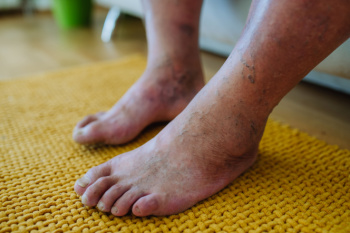Items filtered by date: April 2024
Sudden Ankle Pain Without Injury

Sudden onset ankle pain without any apparent injury can be perplexing and concerning for many individuals. While it may seem mysterious, there are several potential causes behind this discomfort. One common reason can be overuse or strain, particularly from activities like running or jumping. Excessive stress on the ankle joint can lead to inflammation and pain. Additionally, conditions like both osteoarthritis and rheumatoid arthritis can flare up suddenly, causing discomfort in the ankle joint. In some cases, sudden ankle pain may be linked to an underlying medical condition, such as gout or tendonitis. Improper footwear or sudden changes in physical activity levels can also contribute to ankle pain. It is essential to pay attention to any accompanying symptoms and seek medical evaluation from a podiatrist to determine the root cause of the pain. If you have sudden ankle pain, it is suggested that you contact this type of doctor who can offer you relief and treatment options.
Ankle pain can have many different causes and the pain may potentially be serious. If you have ankle pain, consult with Dr. Steven Sheridan from Ankle & Foot Specialty Clinics. Our doctor will assess your condition and provide you with quality foot and ankle treatment.
Ankle pain is any condition that causes pain in the ankle. Due to the fact that the ankle consists of tendons, muscles, bones, and ligaments, ankle pain can come from a number of different conditions.
Causes
The most common causes of ankle pain include:
- Types of arthritis (rheumatoid, osteoarthritis, and gout)
- Ankle sprains
- Broken ankles
- Achilles tendinitis
- Achilles tendon rupture
- Stress fractures
- Tarsal tunnel syndrome
- Plantar fasciitis
Symptoms
Symptoms of ankle injury vary based upon the condition. Pain may include general pain and discomfort, swelling, aching, redness, bruising, burning or stabbing sensations, and/or loss of sensation.
Diagnosis
Due to the wide variety of potential causes of ankle pain, podiatrists will utilize a number of different methods to properly diagnose ankle pain. This can include asking for personal and family medical histories and of any recent injuries. Further diagnosis may include sensation tests, a physical examination, and potentially x-rays or other imaging tests.
Treatment
Just as the range of causes varies widely, so do treatments. Some more common treatments are rest, ice packs, keeping pressure off the foot, orthotics and braces, medication for inflammation and pain, and surgery.
If you have any questions, please feel free to contact our office located in Sandusky, MI . We offer the newest diagnostic and treatment technologies for all your foot care needs.
Exercises for Healthy and Strong Feet
 Strengthening your feet is important for overall well-being, reducing the risk of injury, and maintaining foot health over time. A few simple exercises can go a long way to achieving this. Toe scrunches involve placing a small towel on the floor and gripping it with your toes, then releasing it. This exercise strengthens the muscles in your feet. Another helpful exercise is toe raises, where you lift your toes while keeping your heels on the ground, and then lower them back down. This helps improve flexibility and stability. Additionally, calf raises are beneficial for foot and ankle strength. Stand with your feet hip-width apart, then rise onto the balls of your feet and lower back down. These exercises can be done regularly at home. Along with proper foot care and checkups from a podiatrist, these regular foot exercises can contribute to improved foot health and reduced risk of injury. If you want to learn about more foot exercises to incorporate, or you have questions about your foot health, make an appointment with a podiatrist today.
Strengthening your feet is important for overall well-being, reducing the risk of injury, and maintaining foot health over time. A few simple exercises can go a long way to achieving this. Toe scrunches involve placing a small towel on the floor and gripping it with your toes, then releasing it. This exercise strengthens the muscles in your feet. Another helpful exercise is toe raises, where you lift your toes while keeping your heels on the ground, and then lower them back down. This helps improve flexibility and stability. Additionally, calf raises are beneficial for foot and ankle strength. Stand with your feet hip-width apart, then rise onto the balls of your feet and lower back down. These exercises can be done regularly at home. Along with proper foot care and checkups from a podiatrist, these regular foot exercises can contribute to improved foot health and reduced risk of injury. If you want to learn about more foot exercises to incorporate, or you have questions about your foot health, make an appointment with a podiatrist today.
Exercising your feet regularly with the proper foot wear is a great way to prevent injuries and build strength. If you have any concerns about your feet, contact Dr. Steven Sheridan from Ankle & Foot Specialty Clinics. Our doctor can provide the care you need to keep you pain-free and on your feet.
Exercise for Your Feet
Exercise for your feet can help you gain strength, mobility and flexibility in your feet. They say that strengthening your feet can be just as rewarding as strengthening another part of the body. Your feet are very important, and we often forget about them in our daily tasks. But it is because of our feet that are we able to get going and do what we need to. For those of us fortunate enough to not have any foot problems, it is an important gesture to take care of them to ensure good health in the long run.
Some foot health exercises can include ankle pumps, tip-toeing, toe rises, lifting off the floor doing reps and sets, and flexing the toes. It is best to speak with Our doctor to determine an appropriate regimen for your needs. Everyone’s needs and bodies are different, and the activities required to maintain strength in the feet vary from individual to individual.
Once you get into a routine of doing regular exercise, you may notice a difference in your feet and how strong they may become.
If you have any questions please feel free to contact our office located in Sandusky, MI . We offer the newest diagnostic and treatment technologies for all your foot and ankle needs.
Exploring Gout in the Elderly

Gout, a form of arthritis, presents unique challenges for elderly individuals, necessitating a deeper understanding of its intricacies. Characterized by sudden and severe joint pain, typically in the big toe, gout occurs due to the accumulation of urate crystals in the joints. While gout can affect anyone, its prevalence increases with age, making it a prevalent concern among the elderly population. Various factors contribute to gout development in older adults, including age-related changes in metabolism, chronic health conditions like hypertension and kidney disease, and certain medications commonly prescribed to manage age-related ailments. Dietary habits, particularly rich diets high in purine-containing foods like red meat and seafood, also play a significant role in gout onset and exacerbation. Proper management of gout in the elderly involves a varied approach, encompassing lifestyle modifications, medication adherence, and close monitoring to alleviate symptoms. If you are an elderly person who has had one or more gout attacks, it is suggested that you consult a podiatrist who can help you to manage this condition.
Gout is a foot condition that requires certain treatment and care. If you are seeking treatment, contact Dr. Steven Sheridan from Ankle & Foot Specialty Clinics. Our doctor will treat your foot and ankle needs.
What Is Gout?
Gout is a type of arthritis caused by a buildup of uric acid in the bloodstream. It often develops in the foot, especially the big toe area, although it can manifest in other parts of the body as well. Gout can make walking and standing very painful and is especially common in diabetics and the obese.
People typically get gout because of a poor diet. Genetic predisposition is also a factor. The children of parents who have had gout frequently have a chance of developing it themselves.
Gout can easily be identified by redness and inflammation of the big toe and the surrounding areas of the foot. Other symptoms include extreme fatigue, joint pain, and running high fevers. Sometimes corticosteroid drugs can be prescribed to treat gout, but the best way to combat this disease is to get more exercise and eat a better diet.
If you have any questions please feel free to contact our office located in Sandusky, MI . We offer the newest diagnostic and treatment technologies for all your foot and ankle needs.
Daily Habits for Diabetic Foot Care
 Daily habits for diabetic foot care are essential to prevent complications that can arise from diabetes, such as infections and ulcers. Regular inspection of the feet for cuts, blisters, or red spots can help address any issues head-on. It is also important the feet are kept clean and moisturized, while avoiding lotion between the toes to prevent fungal infection. Proper shoe choice can enhance comfort and prevent blisters. It is helpful not to walk barefoot to reduce the risk of injury. Additionally, managing blood sugar levels helps maintain healthy circulation and nerve function in the feet. Regular check-ups with a podiatrist play a key role in diabetic foot care. These foot doctors can professionally assess the health of your feet, provide specialized care for any issues detected, and offer personalized advice on proper foot care practices. These visits help in early detection and treatment of potential foot problems, reducing the risk of serious complications. If you are a diabetic patient at risk for foot complications, it is suggested that along with daily foot care, you add a podiatrist to your health care team.
Daily habits for diabetic foot care are essential to prevent complications that can arise from diabetes, such as infections and ulcers. Regular inspection of the feet for cuts, blisters, or red spots can help address any issues head-on. It is also important the feet are kept clean and moisturized, while avoiding lotion between the toes to prevent fungal infection. Proper shoe choice can enhance comfort and prevent blisters. It is helpful not to walk barefoot to reduce the risk of injury. Additionally, managing blood sugar levels helps maintain healthy circulation and nerve function in the feet. Regular check-ups with a podiatrist play a key role in diabetic foot care. These foot doctors can professionally assess the health of your feet, provide specialized care for any issues detected, and offer personalized advice on proper foot care practices. These visits help in early detection and treatment of potential foot problems, reducing the risk of serious complications. If you are a diabetic patient at risk for foot complications, it is suggested that along with daily foot care, you add a podiatrist to your health care team.
Diabetic foot care is important in preventing foot ailments such as ulcers. If you are suffering from diabetes or have any other concerns about your feet, contact Dr. Steven Sheridan from Ankle & Foot Specialty Clinics. Our doctor can provide the care you need to keep you pain-free and on your feet.
Diabetic Foot Care
Diabetes affects millions of people every year. The condition can damage blood vessels in many parts of the body, especially the feet. Because of this, taking care of your feet is essential if you have diabetes, and having a podiatrist help monitor your foot health is highly recommended.
The Importance of Caring for Your Feet
- Routinely inspect your feet for bruises or sores.
- Wear socks that fit your feet comfortably.
- Wear comfortable shoes that provide adequate support.
Patients with diabetes should have their doctor monitor their blood levels, as blood sugar levels play such a huge role in diabetic care. Monitoring these levels on a regular basis is highly advised.
It is always best to inform your healthcare professional of any concerns you may have regarding your feet, especially for diabetic patients. Early treatment and routine foot examinations are keys to maintaining proper health, especially because severe complications can arise if proper treatment is not applied.
If you have any questions please feel free to contact our office located in Sandusky, MI . We offer the newest diagnostic and treatment technologies for all your foot and ankle needs.
Are Bunions Affecting Your Everyday Life?
Problems From Wearing High Heels

Wearing high heels can lead to a variety of discomforts and health issues. Continuous friction and pressure from ill-fitting shoes can cause blisters, corns, and calluses. Moreover, the unnatural foot position in high heels can contribute to ankle sprains, stress fractures in the foot or ankle bones, and even long-term problems like arthritis. The altered posture and gait induced by high heels can lead to pain in the knees, hips, and lower back. Additionally, the pressure on the toes can result in deformities like hammertoes or ingrown toenails. A podiatrist can provide valuable assistance in managing these issues. They can offer advice on proper footwear selection and fitting, as well as prescribe custom-made orthotic inserts to alleviate pressure points and improve foot mechanics. Podiatrists can also treat existing foot problems such as blisters, corns, and ingrown toenails, and provide guidance on stretching and strengthening exercises to mitigate the impact of high heels on foot health. If you wear high heels and are experiencing foot pain or any other foot problems, it is suggested that you make an appointment with a podiatrist for care.
High heels have a history of causing foot and ankle problems. If you have any concerns about your feet or ankles, contact Dr. Steven Sheridan from Ankle & Foot Specialty Clinics. Our doctor can provide the care you need to keep you pain-free and on your feet.
Effects of High Heels on the Feet
High heels are popular shoes among women because of their many styles and societal appeal. Despite this, high heels can still cause many health problems if worn too frequently.
Which Parts of My Body Will Be Affected by High Heels?
- Ankle Joints
- Achilles Tendon – May shorten and stiffen with prolonged wear
- Balls of the Feet
- Knees – Heels cause the knees to bend constantly, creating stress on them
- Back – They decrease the spine’s ability to absorb shock, which may lead to back pain. The vertebrae of the lower back may compress.
What Kinds of Foot Problems Can Develop from Wearing High Heels?
- Corns
- Calluses
- Hammertoe
- Bunions
- Morton’s Neuroma
- Plantar Fasciitis
How Can I Still Wear High Heels and Maintain Foot Health?
If you want to wear high heeled shoes, make sure that you are not wearing them every day, as this will help prevent long term physical problems. Try wearing thicker heels as opposed to stilettos to distribute weight more evenly across the feet. Always make sure you are wearing the proper shoes for the right occasion, such as sneakers for exercising. If you walk to work, try carrying your heels with you and changing into them once you arrive at work. Adding inserts to your heels can help cushion your feet and absorb shock. Full foot inserts or metatarsal pads are available.
If you have any questions please feel free to contact our office located in Sandusky, MI . We offer the newest diagnostic and treatment technologies for all your foot and ankle needs.

